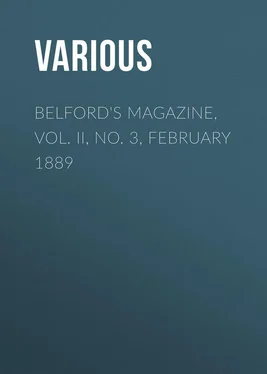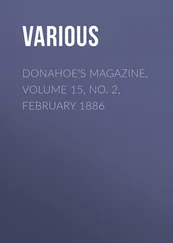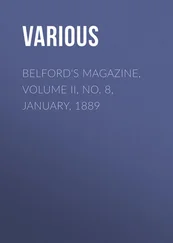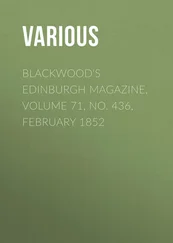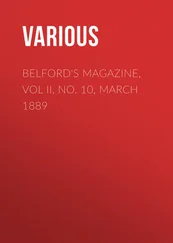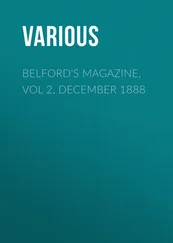Various - Belford's Magazine, Vol. II, No. 3, February 1889
Здесь есть возможность читать онлайн «Various - Belford's Magazine, Vol. II, No. 3, February 1889» — ознакомительный отрывок электронной книги совершенно бесплатно, а после прочтения отрывка купить полную версию. В некоторых случаях можно слушать аудио, скачать через торрент в формате fb2 и присутствует краткое содержание. Издательство: Иностранный паблик, Жанр: periodic, foreign_edu, на английском языке. Описание произведения, (предисловие) а так же отзывы посетителей доступны на портале библиотеки ЛибКат.
- Название:Belford's Magazine, Vol. II, No. 3, February 1889
- Автор:
- Издательство:Иностранный паблик
- Жанр:
- Год:неизвестен
- ISBN:нет данных
- Рейтинг книги:5 / 5. Голосов: 1
-
Избранное:Добавить в избранное
- Отзывы:
-
Ваша оценка:
- 100
- 1
- 2
- 3
- 4
- 5
Belford's Magazine, Vol. II, No. 3, February 1889: краткое содержание, описание и аннотация
Предлагаем к чтению аннотацию, описание, краткое содержание или предисловие (зависит от того, что написал сам автор книги «Belford's Magazine, Vol. II, No. 3, February 1889»). Если вы не нашли необходимую информацию о книге — напишите в комментариях, мы постараемся отыскать её.
Belford's Magazine, Vol. II, No. 3, February 1889 — читать онлайн ознакомительный отрывок
Ниже представлен текст книги, разбитый по страницам. Система сохранения места последней прочитанной страницы, позволяет с удобством читать онлайн бесплатно книгу «Belford's Magazine, Vol. II, No. 3, February 1889», без необходимости каждый раз заново искать на чём Вы остановились. Поставьте закладку, и сможете в любой момент перейти на страницу, на которой закончили чтение.
Интервал:
Закладка:
From that date the populace accepted the situation, and it was quite safe for recruiting squads of colored soldiers to march through every quarter of the city.
It was worth going some distance to see the sergeant selected to command these squads march his men out. Black as a coal, his grand, martial air and proud assumption of authority were most impressive, while his stern, ringing voice made itself heard all over the drill ground. No doubt his pompous manner, aided by his uniform, had much to do in bringing in recruits.
The business of recruiting was, however, one of peculiar danger in other places. About this time a Lieutenant who had been left at Norfolk by Colonel Birney was foully murdered. A little later another was shot down near Benedict, and a recruiting agent was mobbed and killed in Frederick County. On two occasions armed men lay in ambush for the purpose of shooting Colonel Birney, but he was forewarned.
It very soon became evident that more energetic means must be adopted for filling up regiments. Accordingly, a requisition was made for a small steamboat for the purpose of recruiting along the eastern shore of Maryland. Before, however, completing his arrangements to do this, Colonel Birney's attention was called to another matter, the result of which did not tend to make him more popular with Maryland slave-owners.
Calling at General Schenck's office, one morning, a letter was handed him to read by Adjutant-general Piatt, which I here copy verbatim et literatim . It was addressed to President Lincoln and dated:
"Hon. President Abraham Liccln. Sir : i would like to inquire from you sir that we slaves are entitle to Be confine In prison By our masters or not sir. We have bin In Prison for two years and a half and some are Bin in here for seventeen months and so our masters are Rible General A. B. Steward and are now in the Rible Army sir and put us slaves here Before He went into the Rible Army and we are Bin here Ever sence and we are waitin to Be inlisted in the army or navy sir to fite for the stars and stripes there is about 20 of slaves in the Balto city jail our masters says that they are going to keep we slaves in Prison untill the war is over or soon as he can get a chance to send us slaves Down South to the Rebilious and we all would like to have our Liberty sir and i sir i wish you would do something For we Poor Slaves we have no shoes or clothing to put Put on only what we Beg from the soldiers and citizens that comes to the Prison i would like to have my liberty. Direct your letter to Captain James warden in the city jail then he will give the Slaves their Libberty from your humble Servant."
No name was signed to this document, probably from prudential reasons. The name of the warden was, however, repeated, as though to emphasize the address.
Such an appeal could not but make a profound impression on Colonel Birney. He caused some inquiries to be made among the colored people, and learned that there were in the city at least three slave-pens in which men, women, and children had been confined for safekeeping since the beginning of the war. Thirty cents a head per day was the charge for keeping them, and they were to remain in confinement until the close of hostilities.
Col. Birney decided that no time should be lost in attending to this business. He called to see General Schenck about it, but the General had gone to Washington. Colonel Piatt was in the office, however, and unhesitatingly gave the required permit to open the jails.
Taking with him a few soldiers, Colonel Birney visited, one after the other, the dreadful pens where nearly one hundred human beings were found in a condition of misery almost incredible to the present generation. Nearly all the men and many of the women were chained in some manner or other. One aged man wore an iron collar to which a chain was fastened attached to an iron band around one ankle, and so short that it was with difficulty a step could be taken. Another, almost as old, was chained in a similar way from an iron belt to both ankles. Some were handcuffed and some had only their ankles chained together. The only place for fresh air or exercise was a small court-yard inclosed by high brick walls which, being whitewashed, had seriously affected the eyes of all the prisoners. Only a few of them could see well at night, and some were almost totally blind. A few afterwards recovered, but several lost their sight completely. In this condition they had been kept for two years or more.
A blacksmith was sent for, and in a few minutes every chain was broken and the captives were told that they were free. The younger ones received the announcement with shouts and laughter, and ran eagerly to gather up all their little belongings and make themselves as tidy as possible before leaving the prisons. Others were incredulous and timid about accepting the boon offered to them, while the older ones, more deeply imbued with the religious spirit, raised streaming eyes to heaven and thanked the Lord that their deliverance had come at last.
They were all marched to the barracks and examined by the surgeons. A few only were found available as soldiers. The others were sent to the Quartermaster's Department in Washington and disposed of there. The expressions of gratitude from those who remained with us were most fervent, but often a little amusing. Colonel Birney was spoken of among them as a man sent by the Lord, a second Moses come to deliver and lead His oppressed people. He was prayed for in their evening prayer-meetings, and the Lord implored to be with him and "purtect him always, on de right hand and on de left, in de front and in de rar;" and one earnest old man was heard to pray: "Eben as he hab done it unto de least ob dese, my chillun, say de Lord, he hab done it unto me, and we prays dat de Lord will recognize dat fact and bless him accordin'."
The opening of the slave pens, and the revelations concerning the treatment of the prisoners confined there, caused, as may well be supposed, a great sensation. Owners of slaves began to discuss measures to protect themselves from Colonel Birney's operations. Reverdy Johnson was appealed to and secured as their representative, and complaints were forwarded to Washington. That these were not noticed at that time was due, in a great measure, to the influence of the Hon. Winter Davis, then member of Congress, and of Judge Hugh L. Bond, between whom and Colonel Birney a warm friendship existed as well as entire unanimity of opinion on the colored soldier question.
The Colonel now felt free to carry out the plans he had matured, of the success of which he had not the slightest doubt. Taking with him a few of his most reliable officers, he embarked on the steamer that had been furnished him and started on his first voyage of discovery. He was absent a little over a week, and was so much encouraged by what he heard and saw that no delay was made in despatching the boat again, this time in command of one of the lieutenant-colonels.
And now all along the eastern and western shores the news flew that able-bodied men would be received as soldiers, transported to a place of safety, and no questions asked. On it went like the unseen blaze beneath the pine brush, darting out now here, now there, still travelling swiftly and silently until it reached the remotest districts of the State, and the black population knew that its emancipation was in its own hands. Soon one boat was not enough to bring away all who were willing to serve in the Union army. A second boat and then a third were added to the service, and recruiting stations were opened in various parts of the State. To these flocked the slaves, fugitives from both rebel and loyal masters, many of them at the risk of their lives bringing their families with them, walking often forty and fifty miles to reach the station. Here they were protected until the boats came along which carried them to Baltimore. A crowd always gathered to see them land, and followed as – often two and three hundred together – they were marched in double file through the streets to the barracks.
Читать дальшеИнтервал:
Закладка:
Похожие книги на «Belford's Magazine, Vol. II, No. 3, February 1889»
Представляем Вашему вниманию похожие книги на «Belford's Magazine, Vol. II, No. 3, February 1889» списком для выбора. Мы отобрали схожую по названию и смыслу литературу в надежде предоставить читателям больше вариантов отыскать новые, интересные, ещё непрочитанные произведения.
Обсуждение, отзывы о книге «Belford's Magazine, Vol. II, No. 3, February 1889» и просто собственные мнения читателей. Оставьте ваши комментарии, напишите, что Вы думаете о произведении, его смысле или главных героях. Укажите что конкретно понравилось, а что нет, и почему Вы так считаете.
